Go and Tell Everyone About 'Candyman'
‘Candyman’ (2021) builds upon the original 1992 film by presenting the myth of Candyman not only as an example of black pain, but as an opportunity for black vengeance.
Incluvie Foundation Gala - Learn More


Marvel’s first Asian superhero film, Shang-Chi and the Legend of the Ten Rings, hit theatres this labor day weekend and has been a box office success so far. Deserving of high praise, this film balances epic superhero action, a heartfelt family-centric plot, and prioritizes positive Asian representation. Spoilers ahead!
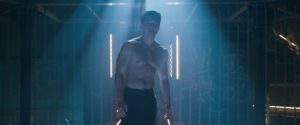
The cast for this film are all extremely talented. Simu Liu’s superhero debut is nothing short of marvelous (pun-intended). Liu has been advocating so much for this film across social media, and it’s been worth it. He is a strong lead in the film, delivering fast and complicated martial arts moves and making it look easy. He’s also solidified his place in many viewers hearts (including this one) as a brand new hero heartthrob after not only his shirtless scene in the fight ring, but also his delivery of little lines throughout the film in which he cares for those around him, particularly Katy (Awkwafina.)

Liu and Awkwafina have amazing chemistry that make them a fun pair to watch. Whether or not they will become a romantic couple remains to be seen, but their friendship is one of the most believable and realistic ones portrayed in the MCU so far. Awkwafina has perfect comedic timing throughout the film. While it’s wonderful to see a female partner stick along for the entire movie (Katy has lots of screentime), it is somewhat disappointing given the controversy surrounding Awkwafina’s “blaccent.”
However, there are other amazing actresses in this film, too. Meng’er Zhang as Xialing is a standout. It’s almost unbelievable that this is her first acting credit! She steals every scene she’s in, holding her own against Shang-Chi both as a fighter and as a presence onscreen. And Michelle Yeoh appears as Ying Nan, Shang-Chi’s aunt. Unfortunately, Yeoh is given little to do, but she shines in her few scenes when she’s giving Shang-Chi advice.
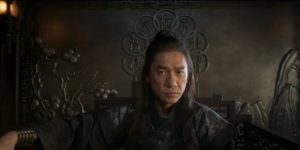
Last, but certainly not least, Tony Leung as Wenwu is one of the best villains in the MCU. His portrayal of Wenwu is so compelling, and his body language and line delivery make the character so sympathetic yet so intimidating to watch. It’s a shame he is killed off in this film — Wenwu as a villain (or future antihero) had so much potential. Yet his death does allow Xialing to take his throne, sowing the seeds for a new villain (or antihero) who can be equally compelling in a different way.
This story centers on family. Fathers and sons. Sisters and brothers. Interestingly, Black Widow recently focused on family, too (albeit surrogate family). However, Shang-Chi does it much better. Shang-Chi’s family is the heart of this film, obvious from the very beginning when his mother tells him the story of meeting his father. The family history is riddled in conflict from the start, signaling this family may perhaps always be in conflict with one another.
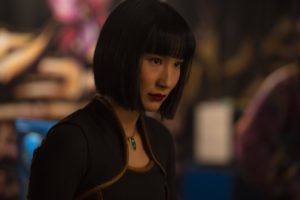
Shang-Chi meets his sister and fights with her at first, although it’s clear he loves her and is protective of her. They bond over the way their father abused them, even if it was in different ways. Xialing was forced into the shadows her entire life. At one point, she mentions how her father will forget Katy if she is silent, like she was. This was a pointed take on the cultural values in China where sons are valued much more than daughters (which has led to an overpopulation of men and not enough women.) Xialing as the daughter wishing to rise above her father and brother was a storyline that many may find relatable. Xialing’s eventual ascension of her father’s throne (in the most girlboss move ever) was the perfect conclusion to her story.
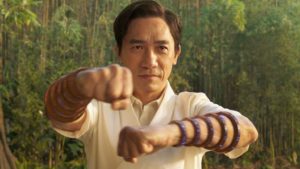
Wenwu, despite being a power-hungry tyrant, is truly a family man in this film. Before his wife’s death, he is shown to be a good father who loved both of his children and treated them equally. His goal in Shang-Chi — to rescue his wife — is a noble one, even if it isn’t real. Wenwu is simply blinded by love for his wife. However, that doesn’t excuse all of the abuse toward his children. He has a complicated relationship with them that, thankfully, the film doesn’t shy away from. Shang-Chi even resolves to kill him, though he ultimately cannot because he is still his father and he still loves him. Even though this is a broken family, deep down they all love each other. This is what makes Wenwu’s death so gut-wrenching — he might have become a better man had he been given the chance. Instead, he sacrifices himself to protect his son. In a way, he dies for his crimes.
Shang-Chi has a surprising number of parallels to Black Panther. It would seem that Shang-Chi’s filmmakers looked to Marvel’s first movie about a superhero of color as inspiration for their own. That’s not to say that the similarities between the two movies are bad, or that these filmmakers were lazy, or that this worsens the quality of the film. On the contrary, it heightens this film. Black Panther is a good example to look to as positive representation for superheroes of color. To Destin Daniel Cretton’s credit, he does an amazing job of pulling specific elements from Black Panther that made it so successful and spinning them to work for his movie, too.
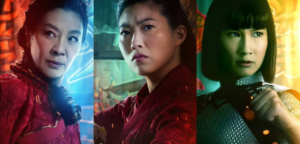
For example, Black Panther was praised for having such a large number of women of color in its cast. T’Challa’s entire support system was made up of Black women who were all badass, well-rounded characters. Shang-Chi does the same — Shang-Chi’s support system is made up of Asian women. Katy is Shang-Chi’s best friend and sticks by his side throughout the film. Despite antagonizing him at first, Shang-Chi’s sister Xialing is a very sympathetic character and becomes an important ally. Ying Nan, Shang-Chi’s aunt, is a mentor to reconnect him with his mother’s culture. And despite being dead, Shang-Chi’s mother Li (Fala Chen) is a crucial figure of inspiration and motivation to him. Even when she falls into the trope of fridged wife and mother, she has clear agency throughout her life. All of these women are total badasses with well-rounded personalities.
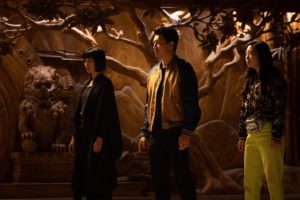
Another parallel between Shang-Chi and Black Panther is the inclusion of a “city on a hill” for a specific community of color. Black Panther’s Wakanda is a household name now, a majestic combination of futuristic technology and traditional African culture that serves as a beacon of hope for the Black community. Shang-Chi’s “city on a hill” for the Asian community is Ta Lo, the homeplace of his mother. Like Wakanda, Ta Lo is separated from the rest of the world where its people might have been oppressed, massacred, and discriminated against. It is a safe haven. However, unlike in Black Panther, this place does not combine traditional culture with futurism, but fantasy. Ta Lo is populated by unique creatures, many of which seem based on real Asian mythology, such as the Chinese guardian lion called the Foo Dog, the nine-tailed fox (from multiple Korean, Japanese, and Chinese myths), the Chinese dijiang or hundun (the faceless winged creature named Morris), and the dragon called the “Great Protector” that lends the people its scales. Here is another similarity: Ta Lo and Wakanda both use a rare, strong material that only comes from their land and weave it into their clothes and weapons.
Shang-Chi has some of the most seamless, beautiful action sequences of any Marvel movie or superhero film I’ve ever seen. The action is enhanced by fantastic cinematography consisting of smooth, active camera movement; a perfect dose of slow-motion shots; and gorgeous wide shots of the beautiful scenery. The action in this movie is treated like an art and often serves as moments for character development. This is a welcome change from the typical superhero movie’s use of action simply for violence and spectacle.
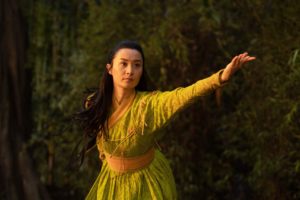
But, let’s be clear, the action of this film is not short on spectacle. The VFX team is to be congratulated for creating such breathtaking visuals that never waver or fall apart in the third act. The beginning fight scene between Jiang Li and Wenwu is gorgeous, inspired by the 2000 Wuxia film Crouching Tiger, Hidden Dragon. The final battle sequence between the Ten Rings, Ta Lo Warriors, “The Great Protector,” and the “Dweller-in-Darkness” is grand and spectacular, a fight like one from godly myths (yet, it never looks fake — the visual effects make each creature seem real).
Other kung fu movies Shang-Chi pays homage to are Kung Fu Hustle, Enter the Dragon, and The 36th Chamber of Shaolin (the inspiration behind the change in design of the Ten Rings, according to producer Jonathan Schwartz in an interview with The Direct). Cretton clearly has a great admiration and respect for these martial arts movies, and that love is translated to the screen.
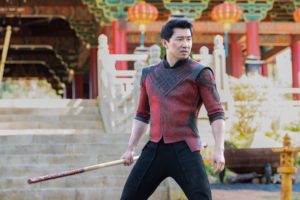
The action is also strengthened by supervising stunt coordinator Brad Allan, protege to Jackie Chan and accomplished martial artist. Allan did stuntwork on many of Chan’s movies, like Mr. Nice Guy, The Tuxedo, and more. Then he graduated to stunt coordinator and choreographer on movies like Rush Hour 3, Kick-Ass, Scott Pilgrim vs. The World, and more. Allan was a talented, well-known stunt coordinator in the industry who recently passed just last month. He is honored at the end of this film.
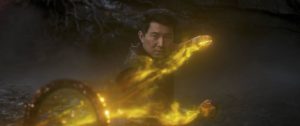
Shang-Chi touches on Asian culture (specifically Chinese) with its nods to famous martial arts movies and dedication to portraying certain types of martial arts accurately. It also spotlights Chinese culture by including many scenes entirely in Mandarin Chinese. Apparently, the dialogue is so authentic that some of its nuances are lost in the subtitles’ translation. Shang-Chi also briefly visits the Asian community in San Francisco. One of the most intimate and sweet moments in the movie is when Shang-Chi has breakfast in Katy’s home, bantering with her family. Although the movie has other goals, it would have been beneficial to delve even more into Chinese culture and the community’s history in America. And although this film is pitched as “Asian representation,” it is mostly Chinese and Eastern Asians who are represented, as is true for many Hollywood films. However, it is a huge step forward for Asian representation in major blockbuster films. Hopefully, big companies like Disney will continue to pursue producing mainstream films that center positive and accurate representation for all Asian communities.
Shang-Chi is in theaters now.
Related lists created by the same author
‘Candyman’ (2021) builds upon the original 1992 film by presenting the myth of Candyman not only as an example of black pain, but as an opportunity for black vengeance.
Related diversity category
This little Netflix film was very inspirational. It passes the Bechdel test, and features a different worldview with rural Indian representation.
Related movie/TV/List/Topic
'Uprooted' is a short film on what's happening in Ukraine as of today. This captures the emotions of the Russian invasion of Ukraine.